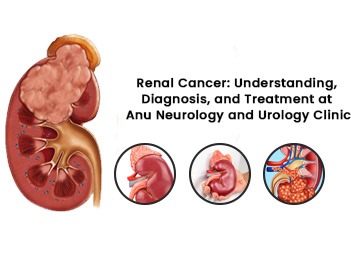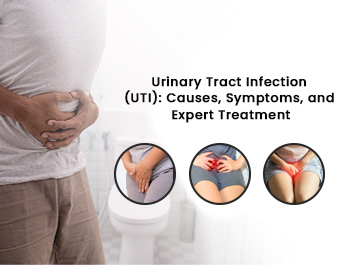
Kidney Cancer: Understanding, Diagnosis, and Treatment at Anu Neurology and Urology Clinic

Introduction to Kidney Cancer
Renal Cancer, also known as kidney cancer, is a condition where cancerous cells form in the tissues of the kidneys. The kidneys, two bean-shaped organs located on either side of your spine, play a crucial role in filtering blood, removing waste, and producing urine. Kidney cancer is relatively common and can affect individuals of all ages, though it is more common in older adults.
While the exact cause of Kidney Cancer remains unclear, several risk factors can increase the likelihood of developing the disease, such as smoking, obesity, high blood pressure, and a family history of kidney cancer. It is important to detect kidney cancer early to provide the most effective treatment options and reduce the risk of metastasis (spread of cancer).
Symptoms of Kidney Cancer
Kidney cancer may not show symptoms in its early stages, which makes it difficult to diagnose at first. As the tumor grows, however, the following symptoms may appear:
- Blood in the Urine (Hematuria): One of the most common signs of kidney cancer.
- Persistent Pain in the Side or Lower Back: Pain that does not go away, even with rest.
- A Lump or Mass in the Abdomen: A visible or palpable mass near the kidney.
- Fatigue: Feeling unusually tired or weak.
- Unexplained Weight Loss: Losing weight without any apparent reason.
- Fever: A low-grade fever that lasts for a prolonged period.
- Loss of Appetite: Reduced desire to eat, often accompanied by nausea.
If you experience any of these symptoms, it is crucial to consult with a healthcare provider for proper evaluation and diagnosis.
Risk Factors for Kidney Cancer
Several factors can increase the risk of developing Kidney Cancer, including:
- Smoking: Smoking is a major risk factor, as the chemicals in tobacco can damage the kidneys.
- Obesity: Excessive body weight is linked to a higher risk of kidney cancer.
- High Blood Pressure: Chronic hypertension can damage the kidneys and increase cancer risk.
- Family History: A family history of kidney cancer can make you more susceptible.
- Chronic Kidney Disease: People with long-term kidney problems, such as dialysis, are at higher risk.
- Gender and Age: Men are more likely than women to develop kidney cancer, and the risk increases with age.
- Exposure to Harmful Chemicals: Prolonged exposure to certain chemicals or toxins, such as asbestos or cadmium, may increase risk.
If you fall into one or more of these categories, it is important to undergo regular check-ups to monitor kidney health and detect any signs of cancer early.
Diagnosis of Kidney Cancer
To diagnose kidney cancer, your doctor will first review your medical history and perform a physical examination. If kidney cancer is suspected, several diagnostic tests may be performed:
- Urine Tests: A urine test can help detect blood in the urine, a common sign of kidney cancer.
- Blood Tests: Blood tests help assess kidney function and may show abnormal levels of substances like calcium, which can indicate cancer.
- Imaging Tests: Imaging techniques, such as ultrasound, CT scans, and MRI scans, are used to create detailed pictures of the kidneys and detect any abnormalities, such as tumors.
- CT Scan: A CT scan is often the primary imaging test for kidney cancer and provides detailed images of the kidneys and surrounding structures.
- MRI: MRI scans can be used to determine the extent of the cancer and whether it has spread to nearby lymph nodes or other organs.
- Ultrasound: An ultrasound can identify masses in the kidneys, although it may not always distinguish between benign and malignant growths.
- Biopsy: In some cases, a biopsy may be performed, where a small sample of tissue is taken from the kidney to be examined under a microscope.
Once kidney cancer is diagnosed, further tests are performed to determine the stage of the cancer, which helps guide treatment decisions.
Stages of Kidney Cancer
Kidney cancer is classified into stages based on the size of the tumor and how far the cancer has spread. The stages are:
- Stage 1: The cancer is confined to the kidney and is small in size.
- Stage 2: The tumor is larger but still confined to the kidney.
- Stage 3: The cancer has spread to nearby lymph nodes or blood vessels around the kidney.
- Stage 4: The cancer has spread to distant parts of the body, such as the lungs, liver, or bones.
The stage of the cancer plays a significant role in determining the most appropriate treatment plan.
Why Choose Dr. Randhir Kumar for Kidney Cancer Treatment in KPHB?
Dr. Randhir Kumar is a renowned urologist specializing in the kidney cancer treatment and other urological conditions. At Anu Neurology and Urology Clinic, Dr. Randhir Kumar provides a comprehensive approach to kidney cancer treatment in KPHB Hyderabad, including advanced diagnostic techniques, surgery, and innovative therapies. His expertise and dedication to patient care ensure that each patient receives personalized treatment tailored to their specific needs.
With a focus on early detection, effective treatment, and compassionate care, Dr.Randhir Kumar is the best choice for kidney cancer treatment in KPHB Hyderabad.
Conclusion
Kidney cancer is a serious condition that requires prompt diagnosis and treatment. Whether you are dealing with a localized tumor or advanced Kidney Cancer, it is crucial to seek expert care as soon as possible. If you are experiencing symptoms of kidney cancer or have concerns about your kidney health, consult with Dr.Randhir Kumar, the best urologist in Kukatpally and KPHB, Hyderabad.
At Anu Neurology and Urology Clinic, you can be assured of comprehensive care for kidney cancer, from diagnosis to post-treatment support. Dr. Randhir Kumar and his team are dedicated to providing the highest quality care and ensuring the best possible outcomes for their patients.
For more information about kidney cancer treatment in KPHB, schedule a consultation at Anu Neurology and Urology Clinic today.
Recent Posts


Common Signs of Neurological Disorders in Newborns

Understanding Different Types of Brain Strokes

